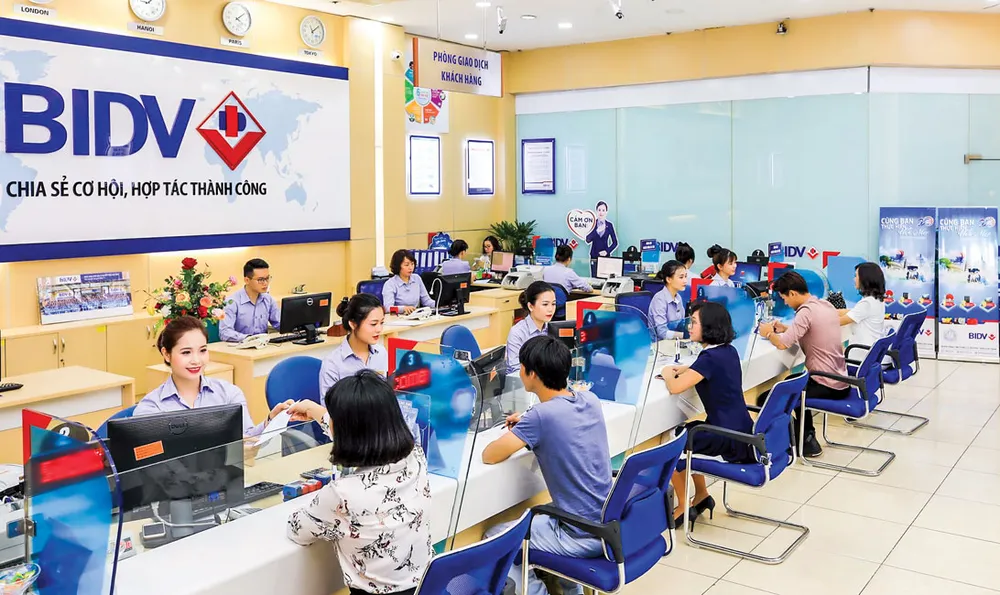
Net interest income improving
In the first nine months of 2019, credit growth grew at a lower rate compared to the same period in 2018, which was based on the credit limit assigned by the State Bank of Vietnam (SBV). However, the ratio of net interest income (NIM) is still improving in commercial banks. For example, Military Commercial Joint Stock Bank (MBB) with expansion of consumer finance; Vietnam International Commercial Joint Stock Bank (VIB) with car loans and house purchases; Joint Stock Commercial Bank for Foreign Trade of Vietnam (VCB) with portfolio shift of debt securities; HCMC Development Commercial Joint Stock Bank (HDB) with promotion of credit debt on mobilized capital (LDR).
This shows that interest income is still a strong motivation for banks, although the growth rate in the first nine months of 2019 slowed down a lot, compared to the same period last year. For ten of the banks on list of VDSC, the proportion of interest income in operating income increased from 75.5% in 2018 to 77.7% in this period, including in MBB, VCB, VIB , HDB, Asia Commercial Bank (ACB), Joint Stock Commercial Bank for Investment and Development of Vietnam (BID), Vietnam Joint Stock Commercial Bank for Industry and Trade (CTG), Vietnam Prosperity Joint Stock Commercial Bank (VPB), Tien Phong Commercial Joint Stock Bank (TPB), and Technological Commercial Joint Stock Bank Vietnam (TCB).
Banks assets will be curbed
On 18 November 2019, the State Bank of Vietnam continuously informed of their decision to reduce deposit interest rates for some short term accounts and also lending rates in some priority areas. The first was Decision No. 2415/QD-NHNN on maximum interest rate for VND deposits of organizations and individuals at credit institutions (CI) in accordance with Circular 07/2014/TT-NHNN dated 17 March 2014. The other was Decision 2416/QD-NHNN of credit institutions' maximum short-term lending interest rates in VND for borrowers to meet capital needs for a number of economic sectors and industries under Circular 39/2016/TT-NHNN.
These regulations may have different immediate effects, depending on the specific policy of each bank. For example, VCB not only reduced interest rates in priority areas, but also reduced interest rates for all business loans by 0.5% in the last two months of the year. With this policy, VCB estimates that the bank profits will decrease by VND 260 bn compared to no interest rate reduction. On the other hand, other banks are less affected, or can benefit when the impact of reducing input rates are offset, or become even stronger than the impact of reduction of output rates.
However, in the long run, according to Government goals of reducing interest rates, as well as recent efforts by SBV to achieve this goal, the banks ability to expand assets yield will become more limited.
Multi-dimensional impact on banks
From the beginning of 2020, a series of new regulations on capital safety, mobilization and consumer finance in the banking industry will take effect. These regulations will have a multi-dimensional impact on the business activities of all banks. First, the safety of new capital (according to Circular 41/2016-TT-NHNN or Circular 22/2019-TT-NHNN) and the reduction of ratio of short-term capital for medium and long-term loans (Circular 22/2019-TT-NHNN), will set stricter requirements on capital and mobilization. This new regulation will limit the ability to expand NIM at banks. The impact of these regulations will be stronger for banks with thin capital buffer such as CTG, or the ratio of short-term capital for medium and long-term loans such as VIB.
Finally, according to the regulations governing lending activities of consumer finance companies (Circular 18/2019/TT-NHNN), banks must gradually reduce rate of direct disbursement to customers, with balance of direct disbursement at consumer finance company of over VND 20 mn to 30% from 2024. Among Consumer finance companies with a relative market share, FE Credit and MCredit are two typical companies having more than 70% of outstanding loans from cash lending. However, the rate of loans disbursed directly to customers with outstanding loans of over VND 20 mn (subject to above regulations) is likely to be lower than 60% (for FE Credit it is 59%). Therefore, the impact of Circular 18 will not be significant in the short term, although in the long term it is likely to affect credit growth and net profit margin of companies focusing on cash loans.
In short, the new rules of the State Bank of Vietnam will restrict the ability to expand the net profit margin of banks with state capital, while the impact on private banks will be multi-dimensional, although banks such as ACB and HDB are less likely to be affected. In particular, we expect banks that are expanding consumer finance, such as MBB and HDB to continue having many opportunities to improve their Net Interest Income in 2020.




















